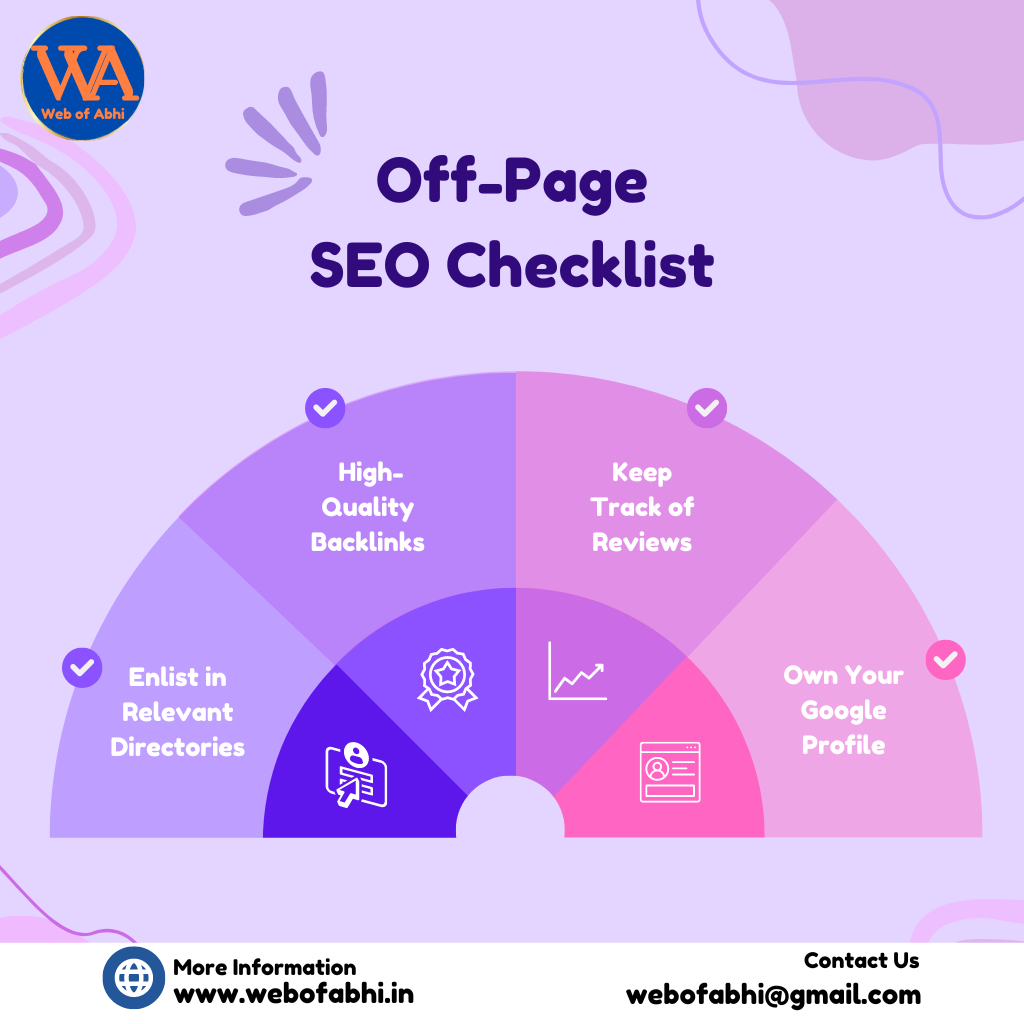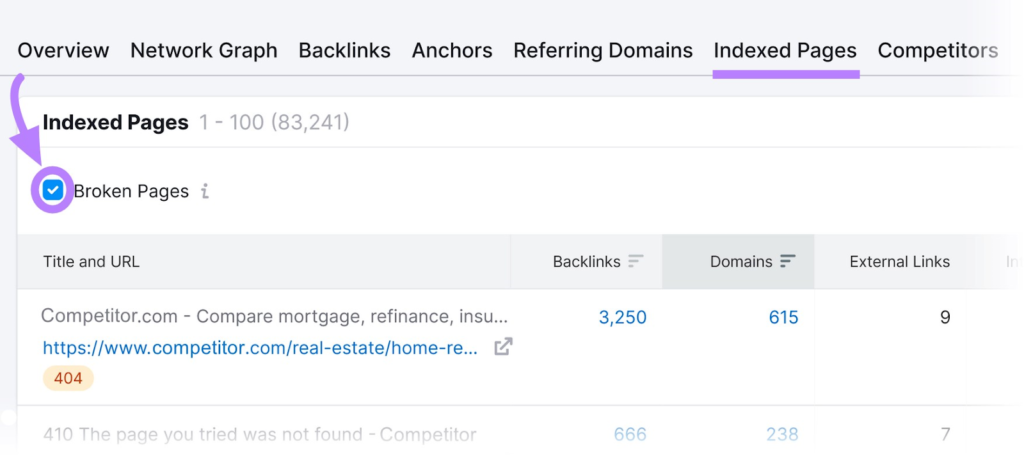How to Rank Your Business Series – Day 06
Off-page SEO plays a crucial role in improving your website’s authority, relevance, and visibility in search engine results. Central to off-page SEO is the process of building quality backlinks from authoritative and relevant websites. In this expert guide, we’ll explore the essential off-page SEO techniques for building quality backlinks that boost your website’s ranking and authority. Leveraging our previous discussions on keyword research and on-page SEO, we’ll demonstrate how off-page techniques complement and enhance your overall SEO strategy.
Let’s Understand Off-Page SEO
Understanding Off-Page SEO
What is Off-Page SEO?
Off-page SEO refers to optimization efforts made outside of the website itself to improve its authority, relevance, and reputation in the eyes of search engines. This includes activities such as building backlinks, social media marketing, influencer outreach, and online reputation management. Off-page SEO signals to search engines that the website is trusted, credible, and popular among users, ultimately improving its search engine rankings and visibility.

Significance of Backlinks
Backlinks are incoming links from other websites to your own. They play a crucial role in off-page optimization by signaling to search engines the relevance, authority, and trustworthiness of your website. The more high-quality backlinks a website has from reputable and relevant sources, the more likely it is to rank higher in search engine results pages (SERPs). For example, if reputable websites in the web development industry, such as web development forums or industry blogs, link to Web of Abhi’s website (webofabhi.in) as a valuable resource for web development services, search engines are more likely to view Web of Abhi as an authoritative and relevant source for web development-related queries.
Types of Backlinks
Natural Backlinks
Natural backlinks, also known as organic backlinks, are links to your website that are earned naturally without any direct action from the website owner. They occur when other websites find your content valuable and decide to link to it voluntarily. Natural backlinks are typically the most desirable type of backlinks as they are earned through the merit of your content and indicate to search engines that your website is trustworthy and authoritative.
Editorial Backlinks
Editorial backlinks are links that are placed within the content of a webpage by the website’s editor or author. These links are typically earned through high-quality content creation and outreach efforts, where website owners or content creators find your content valuable and decide to link to it within their own content. Editorial backlinks are considered highly valuable as they are placed within relevant contextually-rich content and carry a high level of authority.
Outreach Backlinks
Outreach backlinks are links that are acquired through proactive outreach efforts by the website owner or marketer. This involves reaching out to other website owners, bloggers, journalists, or influencers in your industry and pitching them to link to your content or website. Outreach backlinks can be obtained through guest blogging, collaboration opportunities, broken link building, or offering valuable resources or insights. While outreach backlinks require more effort and outreach skills, they can be effective in building relationships and acquiring high-quality backlinks from authoritative sources.
Qualities of Quality Backlinks
Authority and Relevance
Quality backlinks come from authoritative and relevant websites within your industry or niche. Authority refers to the trustworthiness and credibility of the linking website, typically measured by factors such as domain authority, page authority, and the website’s reputation. Relevance refers to the topical alignment between the linking website’s content and your own. Backlinks from high-authority and relevant websites are considered more valuable as they signal to search engines that your website is also trustworthy and credible within the same topic or industry.
Contextual Placement
Contextual placement refers to the placement of backlinks within the content of a webpage, where the link is surrounded by relevant context and content related to the linked anchor text. Contextual backlinks are typically more valuable than links placed in footers, sidebars, or author bios because they provide additional relevance and authority signals to search engines. For example, a backlink within the body of a blog post discussing web development best practices is more contextually relevant and valuable for a web development agency than a link placed in a list of unrelated resources.
Dofollow vs. Nofollow
Dofollow and nofollow are HTML attributes that instruct search engine crawlers how to treat a backlink. Dofollow links pass link equity and authority from the linking website to the linked webpage, contributing to its search engine rankings. Nofollow links, on the other hand, instruct search engines not to pass link equity, meaning they do not directly impact search engine rankings. While dofollow links are generally more desirable for SEO purposes, a healthy backlink profile should include a mix of both dofollow and nofollow links for a natural and balanced link profile.
Strategies for Building Backlinks
Content Marketing
Content marketing involves creating and promoting high-quality, valuable content with the aim of attracting backlinks naturally. By producing informative blog posts, articles, infographics, videos, or other types of content that resonate with your target audience, you increase the likelihood of other websites linking to your content as a valuable resource. Content marketing also involves actively promoting your content through social media, email outreach, influencer marketing, and other channels to reach a wider audience and attract more backlinks.

Guest Blogging
Guest blogging is a strategy where you contribute guest posts to other blogs or websites within your industry or niche in exchange for a backlink to your own website. By offering valuable insights, expertise, or unique perspectives in your guest posts, you can establish yourself as an authority in your field and attract backlinks from authoritative sources. Guest blogging also helps you tap into new audiences, build relationships with other bloggers and influencers, and increase your website’s visibility and authority.
Resource Link Building
Resource link building involves creating high-quality, informative resources such as guides, E-Books, toolkits, or directories that provide value to your target audience. By offering valuable resources that address common pain points or solve specific problems within your industry, you can attract backlinks naturally as other websites reference or cite your resources in their content. Resource link building requires thorough research, comprehensive content creation, and effective promotion to maximize its impact and attract backlinks from authoritative sources.
Broken Link Building
Broken link building is a strategy where you identify broken or dead links on other websites within your industry or niche and reach out to the website owners to suggest replacing the broken link with a link to relevant content on your website. By offering helpful and relevant content as a replacement, you can provide value to the website owner while gaining a backlink to your own website. Broken link building requires careful research, outreach, and relationship-building skills to be effective in acquiring high-quality backlinks from authoritative sources.

One of the best ways to find broken backlinks is with the Semrush Backlink Analytics tool.
Effective Outreach Tactics
Personalized Outreach
Personalized outreach involves tailoring your outreach efforts to each individual recipient to increase the likelihood of engagement and response. This includes addressing the recipient by name, referencing specific details about their website or content, and demonstrating genuine interest in their work. Personalized outreach shows that you’ve done your homework and are reaching out with a genuine intention to provide value, which can lead to better relationships and increased success rates.
Value Proposition
A value proposition is a clear and compelling statement that communicates the unique benefits and value that you offer to the recipient. When conducting outreach for backlink building, it’s essential to clearly articulate the value that you bring to the table and why the recipient should be interested in collaborating with you. This could include highlighting the relevance of your content to their audience, offering to provide valuable insights or resources, or proposing a mutually beneficial partnership. A strong value proposition helps to capture the recipient’s attention and encourages them to take action.
Follow-Up
Follow-up is a crucial aspect of effective outreach that involves sending additional communications to recipients who haven’t responded to your initial outreach. Many outreach efforts require multiple touchpoints to yield results, so it’s important to follow up politely and persistently without being overly pushy. Follow-up emails can serve as gentle reminders, provide additional information or context, or address any concerns or questions raised by the recipient. By staying persistent and responsive, you demonstrate professionalism and commitment, increasing the likelihood of a positive response.
Monitoring and Tracking Backlinks
Backlink Analysis
Backlink analysis involves monitoring and analyzing the backlinks pointing to your website to assess their quality, quantity, and impact on your SEO performance. This process helps you understand which websites are linking to you, the anchor text used in the links, the authority of the linking domains, and any potential issues such as toxic or spammy backlinks. By regularly conducting backlink analysis, you can identify opportunities for acquiring new backlinks, identify and disavow low-quality or harmful backlinks, and gain insights into your overall backlink profile and SEO strategy effectiveness.
Competitor Analysis
Competitor analysis involves monitoring and analyzing the backlink profiles of your competitors to identify their backlink sources, strategies, and performance. By studying your competitors’ backlinks, you can gain valuable insights into the types of websites that are linking to them, the anchor text and keywords used in the links, and any gaps or opportunities in their backlink profiles that you can capitalize on. Competitor analysis helps you benchmark your own backlink performance against your competitors, identify new backlink opportunities, and refine your SEO strategy to stay competitive in your industry.
Ethical Considerations and Best Practices
Avoid Black Hat Techniques
Black hat SEO techniques are unethical practices that aim to manipulate search engine algorithms to artificially boost a website’s rankings. These techniques include practices such as keyword stuffing, cloaking, hidden text, link farming, and buying or exchanging backlinks. While black hat techniques may yield short-term gains, they can result in severe penalties from search engines, including loss of rankings, deindexing, and even banning from search results. It’s crucial to avoid black hat techniques and instead focus on ethical and sustainable SEO practices that prioritize user experience, relevance, and quality content.
Focus on Quality Over Quantity
In off-page SEO, quality should always take precedence over quantity when it comes to building backlinks. Rather than focusing solely on acquiring a high volume of backlinks, prioritize obtaining high-quality backlinks from authoritative, relevant, and trustworthy websites within your industry or niche. Quality backlinks from reputable sources signal to search engines that your website is credible and valuable to users, leading to higher rankings and improved visibility in search results. Additionally, quality backlinks are more likely to drive relevant traffic to your website and result in higher conversion rates. By focusing on quality over quantity, you can build a strong and sustainable backlink profile that contributes to long-term SEO success.
Measuring Success
Key Performance Indicators (KPIs)
Key Performance Indicators (KPIs) are measurable metrics used to evaluate the success of your off-page SEO efforts and track progress towards your SEO goals. Common KPIs in off-page SEO include:
- Number of Backlinks: Tracking the quantity of backlinks pointing to your website from external sources.
- Quality of Backlinks: Assessing the authority, relevance, and trustworthiness of the websites linking to you.
- Referral Traffic: Monitoring the amount of traffic coming to your website from referral sources such as backlinks.
- Brand Mentions: Tracking mentions of your brand or website name across the web, even if they don’t include a hyperlink.
- Social Engagement: Measuring social signals such as likes, shares, and comments on social media platforms. By monitoring these KPIs regularly, you can gauge the effectiveness of your off-page SEO efforts, identify areas for improvement, and make informed decisions to optimize your strategy.
Impact on Rankings
While off-page SEO is primarily focused on improving website authority and visibility through backlinks and online mentions, its ultimate goal is to positively impact search engine rankings. By acquiring high-quality backlinks from authoritative sources and generating buzz around your brand or website, you can improve your website’s credibility and relevance in the eyes of search engines, leading to higher rankings in search results. Monitoring changes in your website’s search engine rankings over time can provide valuable insights into the effectiveness of your off-page SEO efforts and help you assess the overall impact on your website’s visibility and organic traffic.
Building quality backlinks is a fundamental aspect of off-page SEO that can significantly impact your website’s authority, relevance, and visibility in search engine results. By implementing the off-page SEO techniques outlined in this expert guide and leveraging strategic link-building strategies, you can enhance your website’s ranking and authority in the competitive digital landscape.
Stay tuned for more insights on ranking your business in the digital landscape.
AR
Owner of Web of Abhi – Online Business Solution CompanyWeb Developer | WordPress | SEO | Digital Marketing | Graphic Designer | Web Design




